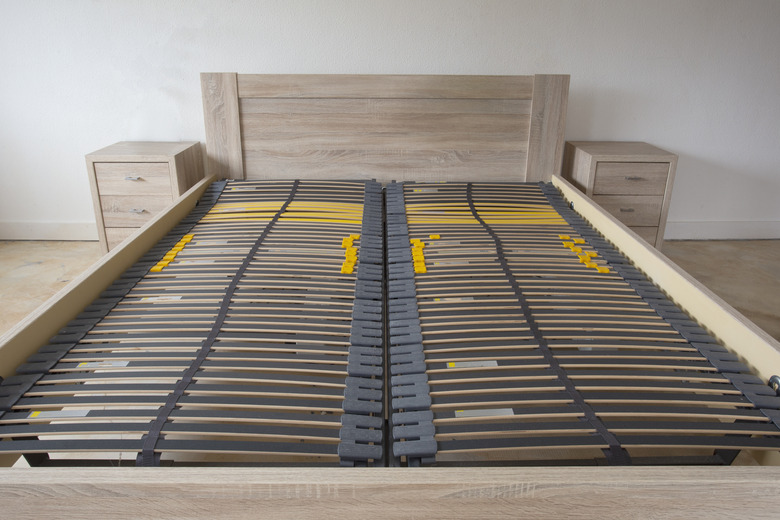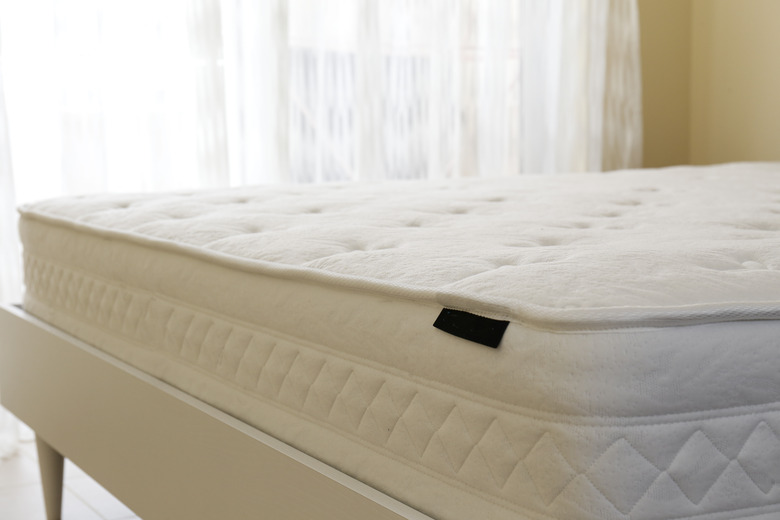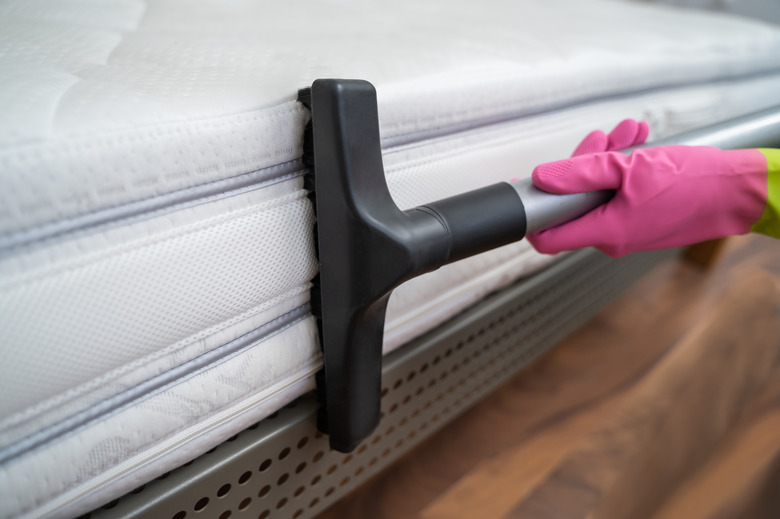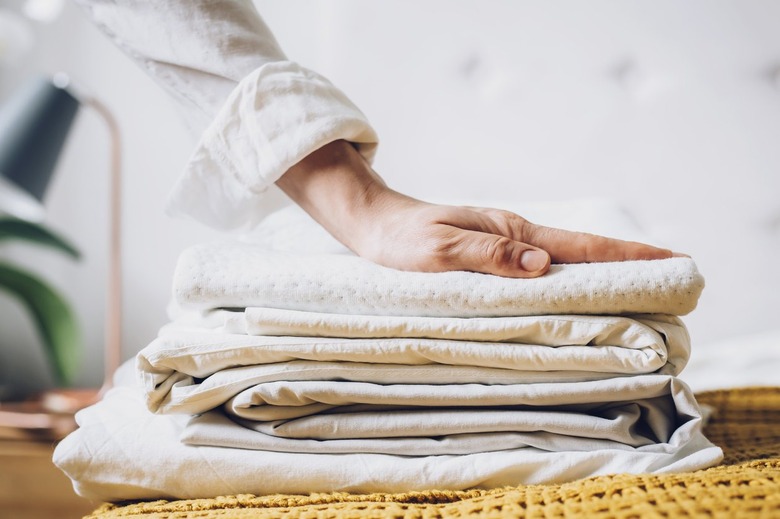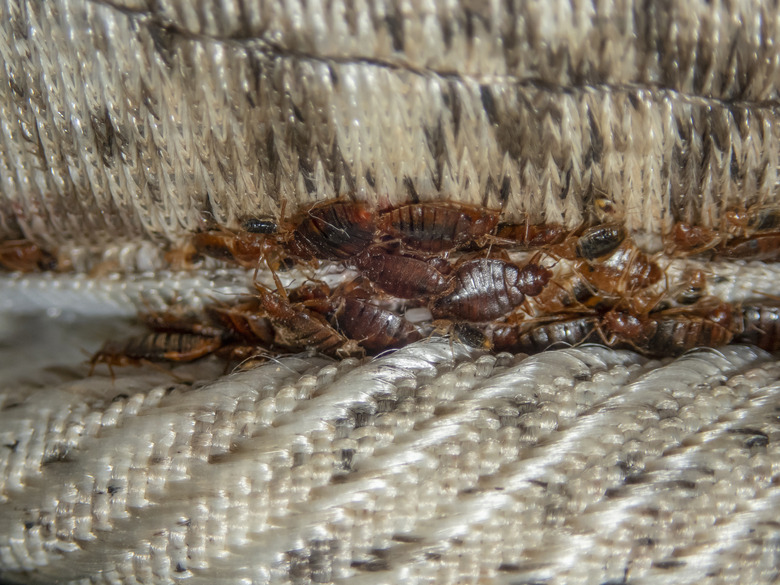10 Ways You're Ruining Your Mattress
We may receive a commission on purchases made from links.
Whether you opt for a traditional innerspring, an organic hybrid, or a body-conforming memory foam version, buying a mattress is a major investment. It's in your best interest to do everything possible to protect that investment. That means following the care instructions from the manufacturer and taking precautions to help the piece remain in excellent condition throughout its life.
With proper maintenance, a mattress can last five, 10, or even 15 years depending on the material. But if you aren't consistently and actively caring for your mattress, you'll probably have to replace it every few years, which can get expensive quickly.
Taking care of your mattress and avoiding damaging mistakes can help you save money in the long run (and sleep soundly every night). Here are 10 ways you might be ruining your mattress inadvertently.
1. Not Supporting Your Mattress
1. Not Supporting Your Mattress
Providing adequate support is one of the most crucial parts of caring for a mattress. Those babies are heavy, and without proper support, they can sag and develop hard spots over time. Not only is a saggy mattress extremely uncomfortable, but it can also lead to painful back problems down the road. If you want your mattress to remain comfortable and last as long as possible, make sure to give it ample support so that it can do its job without incurring damage. The best way to support your mattress is to pair it with a box spring, a foundation (which is a wooden box with wood slats), or put it on top of a platform bed.
2. Using a Platform Bed Frame With Broadly Spaced Slats
2. Using a Platform Bed Frame With Broadly Spaced Slats
If bed height isn't an issue and you have a latex, memory foam, or hybrid mattress, you can skip the box spring. Instead, you can support your mattress with a platform bed frame that comes complete with an outer frame (with or without legs) and evenly spaced wooden slats running across the width of the frame.
That said, getting proper support isn't as simple as slapping down your mattress on any old platform bed frame. The wooden slats must be spaced a certain distance apart for the weight to be distributed evenly. For memory foam, latex, or hybrid mattresses, platform bed slats should be no more than 2 1/2 inches apart. The heavier your mattress, the closer the slats should be. If you use a platform bed frame with slats placed more than 2 1/2 inches apart, you'll have uneven support, and your mattress may not last as long.
Tip
Some mattress companies will void their warranty if the mattress you purchase is used with a platform bed that has slats spaced more than 3 inches apart. Be sure to check the bed frame specs and mattress warranty before purchasing your dream bed.
3. Leaving Your Mattress Unprotected
3. Leaving Your Mattress Unprotected
Mattress protectors aren't just for chronic bedwetters; everyone should use one. They are thin, usually waterproof sheets of fabric that cover the mattress almost like a fitted sheet, typically made from cotton, polyester, or vinyl. Some materials are completely waterproof, while others are designed to be stain-resistant, noiseless, or allergy-reducing (or all of these).
While mattress protectors won't necessarily make your bed more comfortable (that's what mattress pads or toppers are for), they will protect it from damage, especially liquid spills. This will inevitably help your mattress last as long as possible without incurring damage from accidents.
If you have accident-prone kids or pets, a mattress protector is a must. Most are washable or otherwise easy to clean in the event of a spill, unlike a mattress. Plus, they're much less expensive to replace.
4. Not Rotating Your Mattress
4. Not Rotating Your Mattress
Most mattress manufacturers recommend rotating your mattress (pivoting it a full 180 degrees) every six months or so. The idea is to relieve the pressure on the areas of the mattress where you lie every night to allow for even wear around pressure points, which ultimately prevents premature sunken or saggy spots.
New memory foam, latex, and innerspring mattresses should be rotated once or twice a year, while older innerspring mattresses should be rotated more often — up to five times per year.
Tip
Always consult your manufacturer's care instructions before rotating or otherwise maintaining your mattress. Some mattresses, like those with zones for optimum comfort, should not be rotated. Instead, they feature extra support around pressure points to improve comfort.
5. Skipping Regular Cleaning
5. Skipping Regular Cleaning
Not only will cleaning your mattress help you breathe easier but it will also keep bacteria and dust mite buildup in check. If you never clean your mattress (even if you have a mattress protector on it), dust, sweat, and other debris will accumulate. A consistently dirty mattress will wear down much quicker than a clean one. Here's a basic way to clean your mattress:
- Sprinkle baking soda on the mattress.
- Allow it to sit for 15 minutes, which will allow it to penetrate the mattress and absorb moisture and unwelcome odors.
- Vacuum up the baking soda, open the blinds, and let the mattress air out for an hour or two.
Plan to do this basic cleaning every time you rotate your mattress and remember to always spot-clean spills as soon as possible.
6. Not Washing Your Bedding Enough
6. Not Washing Your Bedding Enough
No matter how squeaky clean you are before bedtime, your bedding is bound to accumulate sweat, body oils, dust, dead skin cells, and other contaminants as you sleep. If you don't wash your sheets on a regular basis, that microscopic gunk can settle onto your mattress, which will discolor it and wear it down over time.
If you keep your bed relatively clean (i.e., you don't sleep with a pet, and you have a firm no-food-in-bed rule), then you should wash your sheets and other bed linens once a week. If pets have free rein and bed snacks are your jam, wash your bedding every three or four days.
Tip
Washing your bedding on a regular basis may also relieve allergy symptoms, especially if you suffer from dust allergies. Wash bedding every two to four days if you wake up sneezing every morning. Clean sheets make a huge difference.
7. Keeping Your Mattress in the Dark
7. Keeping Your Mattress in the Dark
You may have heard your grandma spouting off claims about the sunlight and its magical cleaning powers as she hung the laundry on the line. Grandmas do know best — it's true. Thanks to its powerful UV rays, sunlight is effective at killing bacteria. On sunny days, take advantage of the light. Strip your mattress and open the blinds to let in the natural light. The sunlight will kill bacteria that has flourished on your mattress from nights of use.
Keeping your mattress in the dark at all times could promote bacteria growth, so let it see the sun once in a while. If that's not possible, like if you live in a windowless basement apartment, you'll have to disinfect your mattress yourself to keep it in tip-top shape.
8. Jumping on the Bed
8. Jumping on the Bed
As it turns out, your parents were right: Jumping on the bed is a no-no, especially when it comes to mattress upkeep. Jumping on your mattress puts extra stress on it no matter what material it's made from. This will inevitably wear it down and cause premature sagging.
9. Bringing Bedbugs Home
9. Bringing Bedbugs Home
Finding bedbugs in your sleeping area might be one of the most terrifying discoveries. If you've ever been in this situation, you know just how traumatizing it can be. Bedbugs are small, wingless insects that hide in mattresses, bedding, clothing, and the like. At night, they come out to feed on your blood. — no, thank you. These insects are notoriously difficult to get rid of and can easily ruin a mattress.
If you're sleeping away from home and you crash on a bed that unbeknownst to you is infested with bedbugs, they can catch a ride on your clothes and infest your own home. That's why it's important to check the mattress for signs of an infestation wherever you go.
Some common signs of bedbugs include:
- Dark specks or blood spots on the sheets
- Small, pale yellow bug skins and eggshells in the bed
- Live oval-shaped bedbugs
Don't be afraid to lift up the mattress to look in all the nooks and crannies, including around the mattress tag, for signs of bugs.
10. Sleeping With Pets
10. Sleeping With Pets
Do you like to cuddle your cat to sleep, or is your bed a strict no-pets zone? This is a hotly debated topic, and we won't take sides. But we will say that sleeping with pets (yes, even meticulously groomed cats and dogs) introduces extra dirt and bacteria into your bed. If you do sleep with your furry friend, wipe their paws and, if you can, make sure they're relatively clean before allowing them to hop under the covers. You should also clean your mattress and bedding more regularly to make sure dirt and debris don't accumulate, and if you aren't doing it already, use a mattress protector to protect against accidents.
If you don't have pets (or don't sleep with them), rejoice! We're not saying your mattress will last forever, but taking care of it will be much easier for you.


